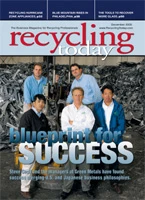CEA STUDY FINDS MOST UNWANTED ELECTRONICS GO TO SECONDARY USERS
A new study by the Consumer Electronics Association (CEA), based in Arlington, Va., reveals that most unwanted consumer electronics go to secondary users, not into America’s waste stream.
According to the CEA, nine out of 10 computers and PC notebooks, eight out of 10 televisions, and seven out of 10 cell phones were donated, recycled or sold in the last 12 months. The biggest beneficiaries of hand-me-down electronics were charities at 34 percent, friends at 28 percent and family members at 26 percent, according to the survey.
The CEA conducted the survey by telephone Sept. 9 to Sep. 12, polling a random sample of 1,032 adults. The responses were extrapolated for an adult U.S. population of 216 million in 111 million households.
While most consumers find alternatives to throwing out their electronics, according to the study, consumers lack awareness and require education about electronics recycling. Despite eight out of 10 Americans’ perception that the recycling of unwanted household items as important, 92 percent believe it is more important to recycle plastics, newspapers and aluminum cans than it is to recycle consumer electronics products (78 percent) or household appliances (77 percent), according to the CEA.
Likewise, though 69 percent of the survey respondents say they recycle household trash all or most of the time, 42 percent say they recycle electronics and 43 percent say they recycle appliances with the same frequency.
"Though electronics recycling is not as widespread as it is for other goods, nearly as many end-of-life products are recycled as are thrown away, which is extremely encouraging given that electronics recycling is just becoming available in some parts of the country," Joseph Bates, CEA’s director of research, says.
Fifty-eight percent of survey respondents say they would prefer an electronics recycling program that facilitates curbside handling, which indicates that consumer convenience is essential to increasing the volume of consumer electronics products recycled, according to the CEA. However, 28 percent of respondents say they would prefer to take the products to a designated recycling center.
When asked who should bear responsibility for electronics recycling management, 57 percent of respondents say that local, state and the federal governments have a significant role play, while half of respondents support paying for a recycling program, regardless of the funding method. Sixty-three percent of survey respondents say that participation in an electronics recycling program should be strictly voluntary, while 35 percent say it should be required by law.
The Consumer Electronics Association (CEA) is a trade association that represents more than 2,000 corporate members involved in the design, development, manufacturing, distribution and integration of audio, video, mobile electronics, wireless and landline communications, information technology, home networking, multimedia and accessory products, as well as related services that are sold through consumer channels.
More information is available online at www.CE.org.

Explore the December 2005 Issue
Check out more from this issue and find your next story to read.
Latest from Recycling Today
- ReMA opposes European efforts seeking export restrictions for recyclables
- Fresh Perspective: Raj Bagaria
- Saica announces plans for second US site
- Update: Novelis produces first aluminum coil made fully from recycled end-of-life automotive scrap
- Aimplas doubles online course offerings
- Radius to be acquired by Toyota subsidiary
- Algoma EAF to start in April
- Erema sees strong demand for high-volume PET systems






